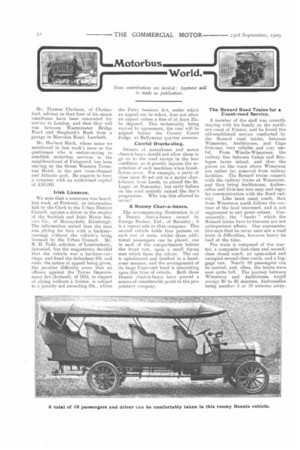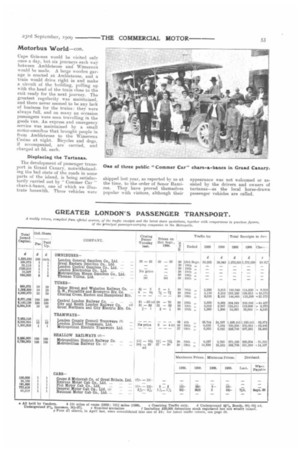Motorbus World.
Page 8

Page 9

If you've noticed an error in this article please click here to report it so we can fix it.
News contributions aye invited : kayment will be made on publication.
Mr. Thomas Clarkson, of Chelmsford, advises us that four of his steam omnibuses have been renovated for service in London, and that they will run between Westminster Bridge Road and Shepherd's Bush from a garage in Hercules Road, Lambeth.
Mr. Herbert Birch, whose name we mentioned in last week's issue as the gentleman who is endeavouring to establish motorbus services in the neighbourhood of Fishguard, has been staying at the Great Western Terminus Hotel, in the new cross-channel and Atlantic port. He expects to form a company with an authorized capital of £10,000.
Irish Licences.
We note that a summons was beard, last week, at Portrush, on information laid by the Clerk to the Urban District Council, against a driver in the employ of the Scottish and Irish Muter Service Co., of Murrayfield, Edinburgh. The information stated that the man was plying for hire with a hackneycarriage without the vehicle's being licensed by the Urban Council. Mr. R.. H. Todd, solicitor, of Londonderry, defended, but the magistrates decided that the vehicle was a hackney-carriage, and fined the defendant 20s. and costs. On notice of appeal being given, the peculiar difficulty arose that an offence against the Towns Improvement Act (Ireland), of 1854, in respect of plying without a licence, is subject to a penalty not exceeding 20s„ whilst the Petty Sessions Act, under which an appeal can be taken, does not allow an appeal unless a fine of at least 21s. be imposed. This technicality being waived by agreement, the ease will be argued before the County Court Judge, at Ballymena quarter sessions.
Careful Overha uling.
Owners of motorbuses and motor (Imes-A-banes should not allow them to go on to the road except in the best condition, as it greatly injures the reputation of such maehines when breakdowns emir. For example, a party of close upon 30 set out in a motor charit-bancs, from Leeds, to attend the St. Leger, at Doucaster, but early failure on the road entirely ruined the day's programme. Why was this allowed to occur A Roomy Char-awbancs.
The accompanying illustration is of a Dennis char-h-banes owned by George Booker, Ltd., of Barnsley; it is a repeat sale to that company. This second vehicle holds four persons on each row of seats, whilst three additional passengers can be placed, one in each of the mnupartments behind the front row. upon a small tip-up seat which faces the others. The car is upholstered and finished in a handsome manner, and the arrangement of its large Cape-cart hood is interesting upon this type of vehicle. Both these Dennis chars-it-hanes have proved a source of considerable profit to the proprietary company. The Renard Road Trains for a Coast-road Service.
A member of the staff was recently staying with his family on the northern coast of France, and he found the old-established service conducted by the Renard road trains, between, Wimereux, Ambleteuse, and Cape One-nez, very reliable and very useful. From Wimile-Wimereux, the railway line between Calais and Boulogne turns inland, and thus the places on the coast above Wimereux are rather far removed from railway facilities. The Renard trains connect with the railway trains at Wimereux, and thus bring Arnhleteuse, Audresselle,s and Gris-nez into easy and regular communication with the Nord rail way. Like most coast roads, that from Wimereux north follows the contour of the land traversed, and is notengineered to any great extent. Consequently, the " banks " which the Renard trains have to traverse are not unimportant affairs. Our representative says that he never once saw a road train in difficulties, however heavy its load at the time.
The train is composed of the tractor, a composite first-class and secondclass closed coach, an open-sided and canopied second-class coach, and a luggage van. Nearly 50 passengers can be carried, and, often, the trains were seen quite full. The journey between Wimereux and Ambleteuse would occupy 30 to 35 minutes, Andresselles being another 5 or 10 minutes away Cape Gris-nez would be visited only once a day, but six journeys each way between Arnbleteuse and Wimereux would be made. A large wooden garage is erected at Ambleteuse, and a train would drive right in and make a circuit of the building, pulling up with the head of the train close to the exit ready for the next journey. The greatest regularity was maintained, and there never seemed to be any lack of business for the trains: they were always full, and on many an occasion passengers were seen travelling in the goods van. An express and emergency service was maintained by a small motor-omnibus that brought people in from Ambleteuse to the Wimereux Casino at night. Bkycles and dogs, if accompanied, are carried, and charged at 5d. each.
Displacing the Tartanas.
The development of passenger transport in Grand Canary, notwithstanding the bad state of the roads in some parts of the island, is being satisfactorily carried out by " Commer Car " chars-h-bancs, one of which we illustrate herewith. Three vehicles were shipped last year, as reported li us at the time, to the order of Senor Ramirez. They have proved themselves popular with visitors, although their
appearance was not welcomed or assisted by the drivers and owners of tartanas-as the local horse-drawn passenger vehicles are called.






















